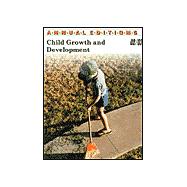| To the Reader | iv | ||||
| Topic Guide | x | ||||
| Selected World Wide Web Sites | xiv | ||||
| UNIT 1 Conception to Birth | |||||
|
|||||
| Unit Overview | xvi | ||||
|
|||||
|
|||||
|
2 | (5) | |||
|
|||||
|
|||||
|
7 | (5) | |||
|
|||||
|
|||||
|
12 | (4) | |||
| UNIT 2 Cognition, Language, and Learning | |||||
|
|||||
| Unit Overview | 16 | (50) | |||
| Part A. Early Cognitive and Physical Development | |||||
|
|||||
|
|||||
|
18 | (3) | |||
|
|||||
|
|||||
|
21 | (3) | |||
|
|||||
|
|||||
|
24 | (4) | |||
|
|||||
|
|||||
|
28 | (5) | |||
|
|||||
|
|||||
|
33 | (7) | |||
|
|||||
|
|||||
|
|||||
|
40 | (6) | |||
|
|||||
|
|||||
|
46 | (4) | |||
| Part B. Learning in School | |||||
|
|||||
|
|||||
|
50 | (5) | |||
|
|||||
|
|||||
|
55 | (4) | |||
|
|||||
|
|||||
|
59 | (7) | |||
| UNIT 3 Social and Emotional Development | |||||
|
|||||
| Unit Overview | 66 | (33) | |||
| Part A. The Child's Feelings: Emotional Development | |||||
|
|||||
|
|||||
|
68 | (4) | |||
|
|||||
|
|||||
|
|||||
|
72 | (5) | |||
|
|||||
|
|||||
|
77 | (4) | |||
| Part B. Entry Into the Social World-Peers, Play, and Popularity | |||||
|
|||||
|
|||||
|
|||||
|
81 | (3) | |||
|
|||||
|
|||||
|
84 | (10) | |||
|
|||||
|
|||||
|
94 | (5) | |||
| UNIT 4 Parenting and Family Issues | |||||
|
|||||
| Unit Overview | 99 | (69) | |||
|
|||||
|
|||||
|
|||||
|
|||||
|
|||||
|
|||||
|
101 | (15) | |||
|
|||||
|
|||||
|
|||||
|
|||||
|
116 | (19) | |||
|
|||||
|
|||||
|
135 | (15) | |||
|
|||||
|
|||||
|
150 | (4) | |||
|
|||||
|
|||||
|
154 | (4) | |||
|
|||||
|
|||||
|
158 | (7) | |||
|
|||||
|
|||||
|
165 | (3) | |||
| UNIT 5 Cultural and Societal Influences | |||||
|
|||||
| Unit Overview | 168 | (51) | |||
| Part A. Social Issues | |||||
|
|||||
|
|||||
|
170 | (3) | |||
|
|||||
|
|||||
|
173 | (5) | |||
|
|||||
|
|||||
|
178 | (3) | |||
| Part B. Special Challenges | |||||
|
|||||
|
|||||
|
|||||
|
181 | (13) | |||
|
|||||
|
|||||
|
194 | (5) | |||
|
|||||
|
|||||
|
199 | (6) | |||
|
|||||
|
|||||
|
|||||
|
205 | (5) | |||
|
|||||
|
210 | (3) | |||
|
|||||
|
213 | (6) | |||
| Index | 219 | (3) | |||
| Test Your Knowledge Form | 222 | (1) | |||
| Article Rating Form | 223 |








